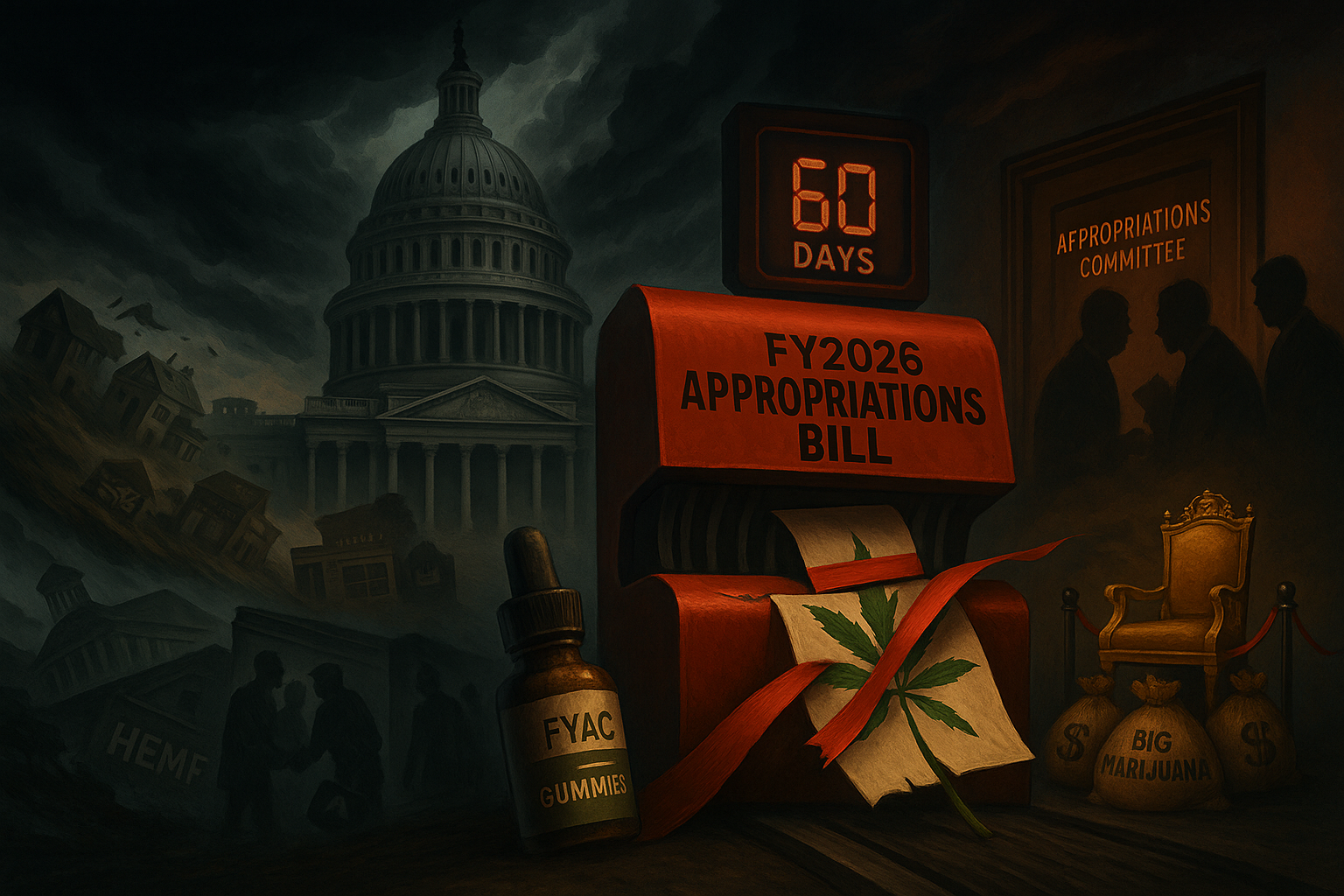
Hemp's Hidden Enemy: How the 2026 Farm Bill Threatens Legal Cannabis
The hemp industry stands at a crossroads. Behind closed doors in Congress, legislation is advancing that could eliminate legal hemp products overnight—not through public debate, but through carefully crafted language buried in agricultural funding bills.
This isn't another regulatory adjustment or minor policy tweak. The FY2026 Agriculture Appropriations Bill contains provisions that would fundamentally redefine hemp, transfer enforcement to hostile agencies, and effectively ban the cannabinoid products that have driven industry growth for years.
With approximately 60 days before this legislation could be quietly inserted into a must-pass Continuing Resolution, the hemp community faces its most serious existential threat since prohibition. Understanding what's happening—and why—is essential for anyone who values consumer choice, small business innovation, and fair market competition.
The Language That Changes Everything
The proposed changes to hemp regulation represent a seismic shift in how we define and regulate cannabis products. Currently, hemp enjoys legal status when it contains 0.3% or less Delta-9 THC. This clear, science-based definition has enabled tremendous innovation while maintaining appropriate legal boundaries.
The new language threatens to destroy this framework entirely. Under the proposed changes, hemp would be redefined to include ALL THC isomers—not just Delta-9, but Delta-8, Delta-10, and even THCA. This technical distinction carries massive practical implications.
The bill would also ban synthetic or non-plant-derived cannabinoids, regardless of THC content. Most concerning is the prohibition on any "quantifiable amount" of THC-like compounds. This vague language could criminalize products that pose zero intoxication risk.
Only hemp used for fiber, grain, oilseeds, and research would survive this regulatory overhaul. Cannabinoid-based wellness products—the segment driving most industry growth and supporting thousands of jobs—would be eliminated entirely.
The Testing Standard Trap
The "quantifiable amount" language is particularly insidious. Modern testing equipment can detect incredibly small amounts of compounds that have no physiological effect. This standard would essentially require hemp products to be completely free of any THC-related compounds—a practical impossibility for many legitimate products.
This isn't about safety or intoxication potential. It's about creating an impossible standard that would force most hemp businesses to close while giving enforcement agencies unlimited discretion to target products they don't like.
Strategic Power Transfer to Hostile Agencies
One of the most troubling aspects of this legislation is where enforcement authority would land. Instead of remaining with the USDA, which has agricultural expertise, or even the DEA, which handles controlled substances, the bill transfers power to the U.S. Department of Health and Human Services.
This isn't an oversight—it's a calculated move. HHS has consistently opposed hemp innovation and lacks the agricultural science background necessary to make informed decisions about hemp cultivation and processing. More importantly, this shift removes small business voices from the regulatory process entirely.
Why HHS Matters
The Department of Health and Human Services operates from a public health perspective that often prioritizes prohibition over harm reduction. Unlike agricultural agencies that understand farming and processing, or even law enforcement agencies that focus on actual criminal activity, HHS approaches cannabis from an ideological standpoint.
This agency has historically opposed cannabis research, blocked studies that might show benefits, and maintained positions that contradict scientific evidence. Giving them control over hemp regulation virtually guarantees that enforcement will be driven by prohibitionist ideology rather than facts.
The Corporate Monopoly Behind the Curtain
To understand why this is happening, follow the money. Big marijuana corporations have spent years building state-by-state monopolies through regulatory capture and political influence. Legal hemp represents their biggest competitive threat.
Hemp businesses operate under federal oversight with rigorous testing requirements. They use federally accredited labs and follow strict quality control protocols. Many hemp products offer similar benefits to marijuana products but without the regulatory complexity, high taxes, and limited access that characterize state marijuana programs.
The contrast between industries is stark. Many large marijuana companies have:
-
Repeatedly violated state regulations without serious consequences
-
Failed safety testing protocols while maintaining market access
-
Exploited workers through immigration law violations
-
Used their political influence to eliminate competition rather than improve products
Meanwhile, hemp testing labs operate under federal accreditation and aren't owned by the same companies they're supposed to regulate—a common practice in state marijuana programs that creates obvious conflicts of interest.
The Testing Lab Distinction
Hemp's testing infrastructure represents a significant investment in consumer safety. Federal accreditation requirements ensure that labs meet high standards for accuracy and reliability. These independent facilities have no financial stake in the products they test, ensuring objective results.
Marijuana testing labs tell a different story. Often owned by the same companies they're supposed to regulate, these facilities face obvious conflicts of interest. When a testing lab's revenue depends on keeping marijuana companies happy, objective testing becomes impossible.
This legislation would destroy hemp's superior testing system to benefit marijuana monopolies that have repeatedly demonstrated they can't be trusted with consumer safety.
The Economic Catastrophe We're Facing
The economic impact of this legislation would be devastating and immediate. The hemp industry currently supports thousands of jobs across rural America, from farmers to processors to retailers. Small businesses have invested millions in equipment, inventory, and employee training based on current regulations.
If this bill passes, these businesses won't have time to adapt. The language is written to take effect immediately, meaning:
-
Existing inventory would become illegal overnight
-
Employees would lose their jobs with no notice
-
Small business owners would face potential criminal liability
-
Tax revenue would disappear from communities that depend on hemp businesses
The Ripple Effect
The economic destruction would extend far beyond hemp companies. Packaging firms, shipping services, marketing agencies, and countless other businesses that serve the hemp market would lose a major revenue source. Rural communities that have embraced hemp as an economic development tool would be left without alternatives.
Consider the farmer who invested in hemp cultivation equipment, the processor who built extraction facilities, the retailer who stocked hemp products, and the laboratory that provides testing services. All of these businesses—and their employees—would face immediate economic devastation.
The Stealth Legislative Strategy
Perhaps most troubling is how this legislation is being advanced. The language has already passed both House and Senate subcommittees with minimal public attention. The goal is to slip these provisions into a Continuing Resolution—a must-pass funding bill that Congress typically approves without extensive debate.
This isn't the first attempt at this stealth strategy. Similar language was included in the 2024 appropriations process but was ultimately removed after public pressure. The difference now is that supporters are being more strategic about timing and messaging.
The Continuing Resolution Trap
Continuing Resolutions are typically passed under tight deadlines with limited opportunity for amendments or public input. By embedding hemp restrictions in agricultural appropriations, the bill's authors are betting that most lawmakers won't notice the language until it's too late.
This legislative strategy deliberately circumvents public debate and democratic input. Instead of defending their position in open hearings, bill supporters are trying to implement policy through backdoor maneuvering.
What's Really at Stake
This fight transcends hemp products. It's about whether small businesses can compete with corporate monopolies. It's about whether consumers have access to safe, legal alternatives. It's about whether regulatory policy is driven by science or special interests.
The hemp industry represents everything that's right about American entrepreneurship. Small businesses identified a market opportunity within existing legal frameworks. They invested their own money, created jobs, and built an industry that benefits consumers and communities.
Now, corporate interests are using their political influence to eliminate this competition through backdoor legislation. They're betting that the public won't notice until it's too late.
The Broader Implications
If this legislation succeeds, it will establish a dangerous precedent. Industries that threaten established monopolies could face similar attacks through buried legislative language and regulatory capture. The principle that businesses should compete on merit rather than political influence would be abandoned.
Consumer choice would be eliminated in favor of corporate control. Innovation would be stifled to protect existing profit margins. The free market principles that made America prosperous would be sacrificed to benefit politically connected interests.
The Path Forward: Action Required Now
We have approximately 60 days to prevent this catastrophe. The legislative process moves quickly once appropriations bills reach the floor, and there may be limited opportunities for amendments or public input.
The American Healthy Alternatives Association is leading the fight against this legislation through lobbying, public education, and grassroots mobilization. But success requires unprecedented public engagement from everyone who benefits from hemp access.
Immediate Action Steps
Contact your representatives immediately. Explain how this legislation would affect your business, your community, or your access to products you depend on. Share this information with others who might not be aware of what's happening.
Most importantly, don't assume someone else will handle this. The opponents of hemp have spent years building political relationships and financial resources. They're counting on hemp supporters to be disorganized and uninformed.
Time to Defend American Innovation
The hemp industry has survived and thrived because it provides value to consumers within a legal framework. Small businesses have created jobs, generated tax revenue, and offered safe alternatives to dangerous black market products.
This legislation would destroy all of that progress overnight. It would eliminate jobs, reduce tax revenue, and force consumers back to unregulated alternatives. All to protect the profit margins of corporate marijuana monopolies.
The choice is clear. We can fight now, while there's still time to influence the legislative process. Or we can watch as years of progress are wiped out by corporate greed and regulatory capture.
The hemp industry is worth fighting for. The jobs it creates, the communities it supports, and the consumers it serves deserve better than backroom dealing and corporate favoritism. The future of hemp—and the principles of fair competition and consumer choice—depends on what we do right now.
Contact your representatives today. Join the American Healthy Alternatives Association. Share this information with everyone you know. The clock is ticking, and the stakes couldn't be higher.



